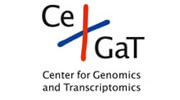LAB HOURS: MON - THU and SAT : 9:00 AM to 9:00 PM
FRI and SUN : 9:00 AM to 6:00 PM

Lecture - Lactic acidosis: diagnosis and management
FML seminar: Metabolic Disorders in Infancy and State of the Art in Newborn Screening in Dubai, Dec 10, 2011

Lactic acidosis: diagnosis and management
Prof. Dr. Peter Freisinger (MD)
Professor of Pediatrics, University of Technology, München, Germany
Director of the Department of Pediatrics, Klinikum Reutlingen
Director of the Metabolic Disease Center, Klinikum Reutlingen
Abstract
Primary lactic acidosis (LA) is frequently encountered in pediatrics and caused by different metabolic defects. Disorders of energy metabolism like pyruvate dehydrogenase complex (PDHc) deficiency and a multitude of various disorders affecting the function of the mitochondrial respiratory chain including cofactor deficiency like thiamine deficiency are most frequently the cause of primary LA. Typically, organic acidemias like methylmalonic academia or propionic academia and biotinidase deficiency can present with LA. Disorders of gluconeogenesis like hepatic glycogen storage disease or fructose 1,6biphosphatase deficiency also typically present with LA.
Effective therapy is dependent on the diagnosis of the primary cause of LA. After exclusion of secondary LA rapid analytical methods (selective screening by TMS, analysis of organic acids in urine a. o.) is crucial for adequate therapy.
Unspecific and specific therapeutical approaches can be distinguished. In very severe LA removal of lactic acid by hemofiltration may be necessary to prevent or reduce the toxic effects of high lactate on CNS. Buffering with bicarbonate is frequently required. Treatment with dichloroacetate is controversially discussed. According to the primary cause of lactic acidosis specific therapies have to be applied: in disorders of energy metabolism - especially PDHc deficiency - carbohydrate supply has to be kept minimal and high fat intake may be useful. A combined cofactor treatment with thiamine, coenzyme Q10, riboflavin and biotin should be applied until a specific diagnosis has been achieved.
In organic acidurias high carbohydrate administration is important and protein must be restricted to 0.5mg/kg/d. The treatment with cofactors is specific and depends on the exact diagnosis (e.g. biotin in biotinidase deficiency, cobalamine in methylmalonic acidemia etc.).
Two examples, one case with an unusual cause for a secondary LA and a new defect in thiamine metabolism will be presented to illustrate the challenges in diagnosis and treatment of LA.

Lab hours
MON - THU and SAT 9:00 AM to 9:00 PM | FRI and SUN : 9:00 AM to 6:00 PM













